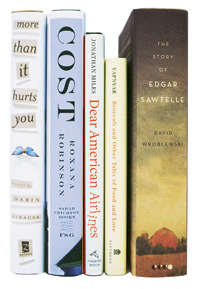
Dear American Airlines
Jonathan Miles, Houghton Mifflin, $22
Desperately needing a plane read, you’ll be tempted to pick up the ubiquitous new David Sedaris collection. Instead, you might want to try a travel companion you’re unlikely to find in an airport. Benjamin R. Ford is writing a letter of complaint to the airline that’s left him stranded at O’Hare on the eve of his estranged daughter’s “commitment ceremony”; it becomes a novel-length lament for Ford’s wasted years as a translator, failed poet, and alcoholic. Funnier at times than both Sedaris and Augusten Burroughs, and more deft with a simile, Miles replants fiction’s flag in the territory of personal demons. He does occasionally stumble in the same way memoirists have—with a verbose redemption monologue and a whacked-out mother too reminiscent of Ma Burroughs (though maybe this is the fault of Burroughs). Yet there’s also a vivid and winning novel-within-the-novel and, crucially, a narrator who pulls back from misanthropy exactly where a real human would. Fictional or not, unreliable narrators are a dime a dozen; believable ones are rare.
BUY IT
Cost
Roxana Robinson, Sarah Crichton Books/FSG, $25
For twenty pages or so, Cost appears to be one of those deadly fiction-M.F.A. thesis novels, where every step of making a sandwich leads to a meditation on life. “She spread the mayonnaise, smoothing it creamily out to the edges. The tangible world: she admired the rich surface of the mayonnaise. Opaque, succulent.” Moreover, it has the hallmarks of those dreary books: upper-middle-class protagonists, largely in denial, to whom something depressing happens (in this case, a son’s addiction). Yet Roxana Robinson somehow turns this badly stacked deck into a very fine and swiftly moving book propelled forward by multiple subtle changes in point of view—and an actual plot.
BUY IT
The Story of Edgar Sawtelle
David Wroblewski, Ecco, $25.95
Lifting a plot straight from the Western canon can be a risky endeavor. Yet if David Wroblewski’s debut, a Hamlet story set on a dog farm in Northern Wisconsin in the seventies, succeeds, it’s in spite of its literary pretensions, not because of them. Our Dane is Edgar, a 14-year-old mute from birth. After his father dies and his mother turns to his nefarious uncle Claude for solace, Edgar takes off into the wilderness, bringing along three of his dogs (a preternaturally sensitive breed whose mysterious genetic origin provides the book’s most intriguing subplot). Wroblewski’s adherence to his Shakespearean framing device can seem labored, as secondary characters shuffle in to fulfill their assigned roles, but the most compelling moments come when he takes a breakfrom the melodrama to explore the more workaday aspects of human (and canine) emotion.
WAIT FOR THE PAPERBACK
More Than It Hurts You
Darin Strauss, Dutton, $24.95
All is not well in the young Goldin household, out on suburban Long Island. Husband Josh, a menschy frat-boy type who works in TV-ad sales, may not be paying enough attention to stay-at-home wife Dori, a former phlebotomist, who may—she’s just too good with needles—be endangering their baby. Wait a minute: Are we dealing with Munchausen syndrome by proxy here (a.k.a. excellent adapted-screenplay material)? This is the first novel by Darin Strauss (Chang and Eng and The Real McCoy) to be set in contemporary America, and there are, amid some nice psychological insights and turns of phrase, a few not so nice ones: “[S]ome days [Josh] felt like a kind of Big Mac, his feet the lower bun, his head the upper, and in between layers and layers of squashed resentment.” Plus explorations of race (the doctor who puts Child Protective Services on the case is black) and tabloid culture—deliberately satiric or not—that make one long for the comparative subtleties of The Bonfire of the Vanities. Call this Lifetime literature.
WAIT FOR IT ON CABLE
Broccoli and Other Tales of Food and Love
Lara Vapnyar, Pantheon, $20
In our gastro-obsessed culture, it would be easy to mistake Lara Vapnyar’s second book of stories for yet another self-help fantasy in the profitable school of Eat, Pray, Love and Julie and Julia. (Pantheon’s marketing won’t disabuse you of the notion: The cover sports a lone broccoli in the shape of a heart.) But a better analog for Vapnyar’s six lapidary short stories can be found in the unsentimental prose of Jhumpa Lahiri, another spare realist who crafts a circumscribed world of immigrants at sea in our globalized culture. Vapnyar knows and sticks to her own ground: first-generation Russians eking out a living in Brooklyn, the majority working as computer programmers, a few others as students and carpet installers, and one as a nanny who moonlights as a prostitute. Food is simply an entry point into her character studies, and when she writes that a bowl of hot borscht is “[s]teaming, bursting with color. All shades of red in perfect harmony with the faded purple of beets,” you know that healing isn’t far away.
BUY IT